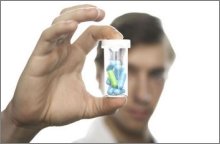Statins and Other Cholesterol-Lowering Drugs:
What Are the Risks and Alternatives?
by www.SixWise.com
Millions of Americans take statin drugs, the so-called "wonder"
drugs that lower bad cholesterol, thereby protecting against
heart disease. Some 203 million prescriptions for the drugs
were written in 2006, raking in close to $16.5 billion, according
to health care information company IMS Health Inc.
|

Statin drugs bring in $16.5 billion a year.
|
Statins, now the second-most prescribed drugs in the United
States (antidepressants are the most prescribed), work by
interfering with an enzyme that your body needs to make cholesterol.
Along with lowering cholesterol, the drugs -- which include
Lipitor, Zocor, Mevacor, Pravachol, Crestor and others --
may also help your body reabsorb cholesterol that has accumulated
on your artery walls, helping to prevent further blockage.
Now the standard treatment for people at
risk of heart disease or with high cholesterol, statins
have become a household word. In Britain, they are even planning
to recommend the drugs to anyone who has a 20 percent chance
or more of developing heart disease over the next 10 years
-- even if they have no symptoms. This would add as many as
14 million people to the list of those "needing"
statins.
"This is turning people into patients," says Dr.
Peter Brindle, a researcher in cardiovascular disease at Bristol
University, of the new recommendations. "They are going
to be offered this preventative drug for the rest of their
life with all the risks and side effects. There has to be
a public debate about whether society feels this should be
done."
Statin drugs, of course, are not without risk, and questions
are being raised as to whether the benefits of lower cholesterol
outweigh the drugs' potential side effects -- particularly
when diet and lifestyle changes can often do the trick as
well.
The Risks of Statin Drugs
Statin drugs can cause an increase in liver enzymes, leading
to permanent liver damage. Because of this, people taking
the drugs must have their liver function tested periodically.
Statins are also known to cause muscles pain, joint aches
and tenderness -- the most commonly reported complaints --
including the serious rhabdomyolysis (muscle wasting), in
which body tissues begin to break down, resulting in kidney
damage and failure. Nausea, diarrhea, abdominal pain, constipation,
headaches and skin rash are other known side effects.
|

Leading a healthy lifestyle with plenty of whole foods
and exercise is a proven way to lower your cholesterol
and ward off heart disease.
|
Statin drugs are also known to block the production of important
nutrients in the body, including CoQ10, which is beneficial
to heart health and muscle function.
Other potential risks detailed by The Weston A. Price Foundation
include an increased risk of polyneuropathy (nerve damage
that causes pain in the hands and feet and trouble walking)
and, ironically, heart failure due to CoQ10 depletion. Dizziness,
cognitive impairment, a potential increased risk of cancer,
decreased function of the immune system and depression are
other serious risks.
Statins have also recently been linked to a potential increased
risk of Lou Gehrig's disease.
Other cholesterol-lowering drugs also have side effects,
most notably muscle pain and weakness.
How to Lower Cholesterol Naturally
Much of the controversy surrounding cholesterol-lowering
drugs has to do with the fact that cholesterol can often be
lowered -- and heart disease prevented -- by making lifestyle
changes.
The keys to lowering cholesterol naturally include:
Even the Mayo Clinic maintains that making the above lifestyle
changes can reduce your risk of heart disease and stroke better
than taking medication alone.
Are Certain Statins Safer Than Others?
What should you do if you've made positive changes in your
lifestyle, yet your cholesterol is still high?
One controversial option is to not worry about it. A small
but growing group says that high cholesterol is not, in fact,
the cause of heart disease. Proponents of this controversial
view point out that cholesterol is a crucial part of the human
body, necessary for proper neurological function, hormone
production, and repair, along with helping to digest fats
and acting as a powerful antioxidant.
If your cholesterol is low, they posit, you can have adrenal
problems, blood sugar problems, mineral
deficiencies, chronic inflammation, reproductive troubles,
allergies, asthma and difficulty healing, among other issues.
Getting your cholesterol to adhere to the national recommended
levels, they maintain, is not necessary to be healthy.
Alternatively, you could consider taking a statin, keeping
in mind that you could be taking them for the rest of your
life. While all of the varieties carry risks, Lipitor and
Crestor may be among the most risky options because they are
typically given at higher dosages.
Recommended Reading
10
Top Foods to Help You Fight High Cholesterol
High
Cholesterol? The TOP 12 Non-Drug Strategies to Increase Your
HDL Levels
Sources
DelawareOnline
July 10, 2007
FoxNews.com
June 24, 2007
The
Weston A. Price Foundation